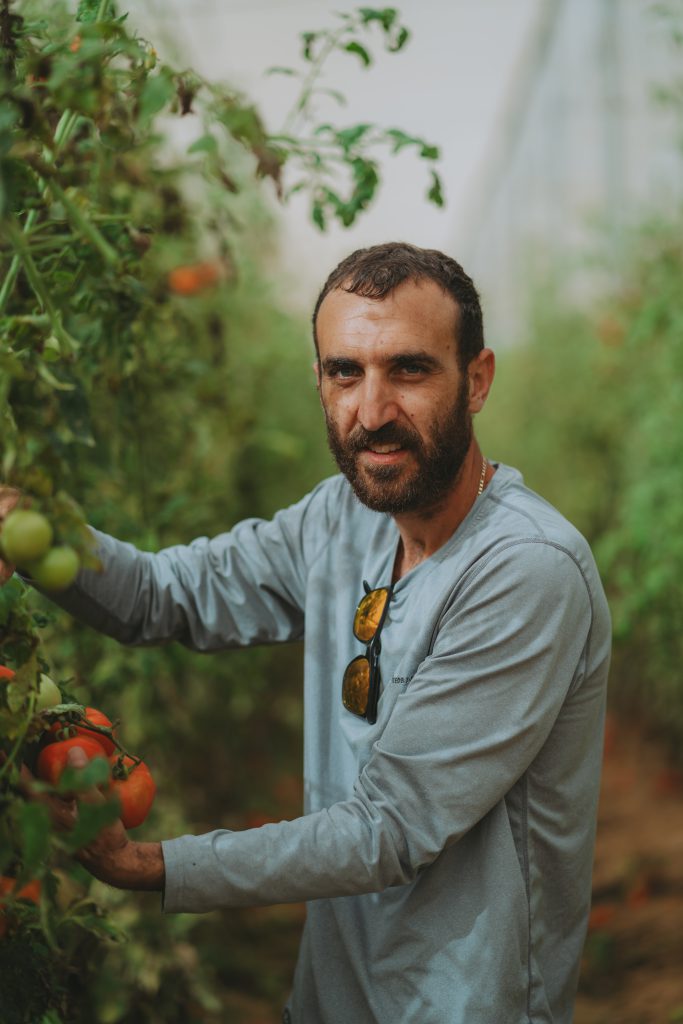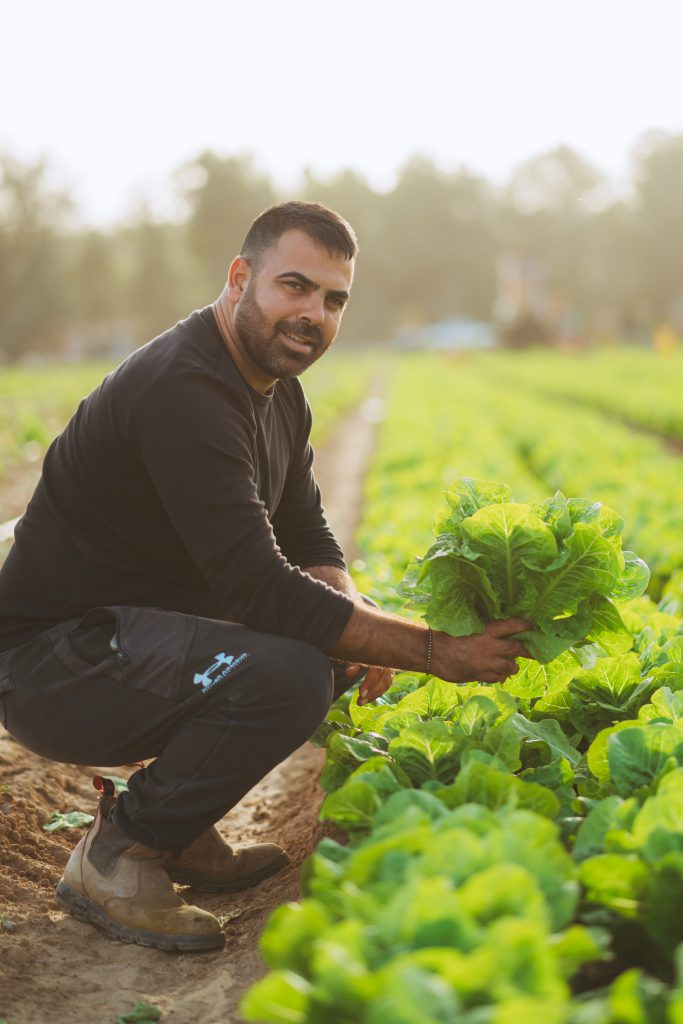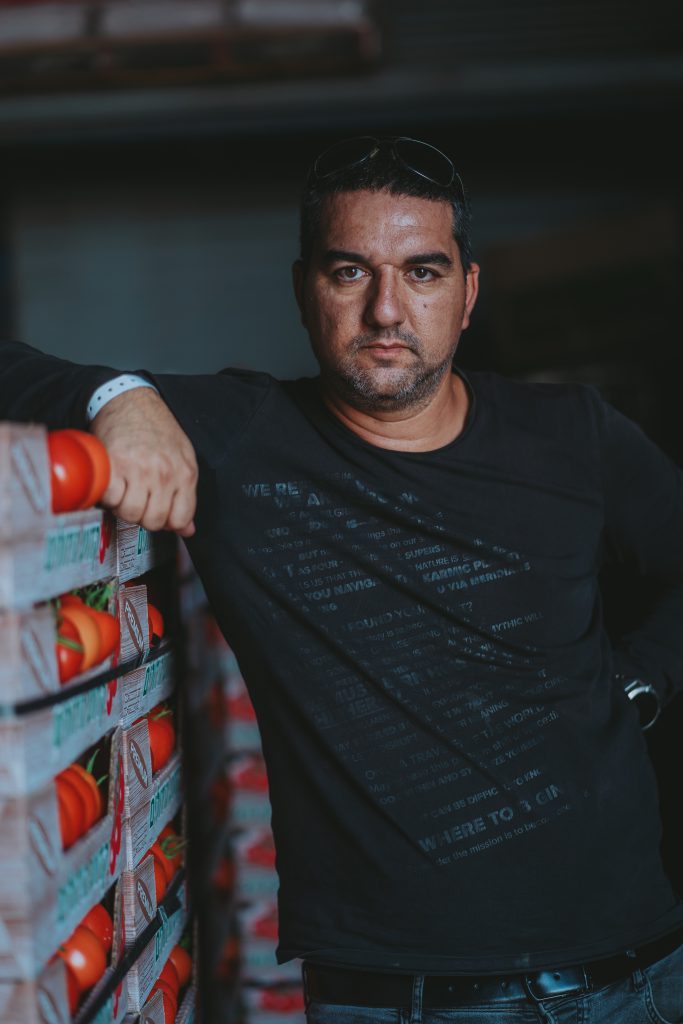Here are a handful of the stories of farms in the kibbutzim and Moshavim surrounding the Gaza Strip.
These farms were on the front line on the 7th of October attacks. Each farmer, each face tells the story of perseverance and diligence. On the one hand, it is a tale of severe destruction, and on the other, it is a story of the blossoming of fruit and vegetables on desert Negev land – a story of Zionism. Since the outbreak of the war, HaShomer HaChadash has been sending thousands of volunteers a day to assist the farmers and prevent the decimation of Israeli agriculture.
Tzadok, 35, is the farmer of the “Tamar Shlomo farm”
on October 7th, several Hamas terrorists stormed into his Moshav, intending to massacre and kidnap families. The Moshav’s community watch fought them bravely, yet five members of the Moshav were tragically killed in battle.
9 years ago, Tzadok took on his grandfather's 62-acre tomato and leafy greens greenhouses. “Before the volunteers began coming in masses, I planned to dry the crops and close the farm. Once they arrived, I saw how it saved the produce.
To be honest, it also saved me personally. I was stuck in a hotel with all the evacuated kibbutz members. I wasn’t eating or sleeping. Working in the fields with all the volunteers brought me back to life and got me back on my feet.”
Volunteers from all over have been coming. A group of volunteers from the Har Bracha preparatory school in the 11th grade, an 80-year-old woman who came by herself, and a couple from Tel Aviv who have volunteered on my farm regularly since the war broke. The beautiful people of Israel.
I have six foreign workers left out of twenty-four. Some of them lost friends at the attack, friends who were kidnapped and murdered. The rotten crops you see on the ground are those we didn’t harvest in time. There are young plantations with no one to take care of them, preparations of plots that I cancelled for the Passover harvest.
We need any support we can get. Without the volunteers, my life’s work would have been destroyed.


Moti, 49, is a second-generation farmer, and following his father's footsteps, he grows lemons and cabbages.
“I had 40 Thai workers two months ago, and now I have 6.
We were broken when we had to leave our home, our farm. After the first week, we had to destroy almost 150 acres of produce that rotted. But then volunteers started coming. We were shocked at the immediate response.
HaShomer is sending volunteers from all over, and though the work is challenging, they continue to minimize the damage and assist in any task we need. Yet, in the long term, and despite the goodwill, without skilled workers, we won't be able to prepare the land, layout and connect water pipes, and conduct other tasks that require experience that volunteers lack.”
Adir, 34, a farmer from Moshav Zroa who grows lettuce, cauliflower, cabbage, and Broccoli.
Adir has an astonishing capacity of 150 thousand lettuce heads that he supplies weekly to the market.
“Currently, no lettuce is sold in the Israeli market because of the war and the manpower shortage in the fields. Customers, marketers, and packaging houses are buying produce that would have never been sold in routine due to its poor quality. I have had to throw over 200 thousand lettuce heads that rotted. The volunteers at HaShomer were game changers, and thanks to them, many farms were saved, and the agriculture industry is still going. We rely on volunteer persistence until the industry’s normalcy and recovery.”


Dudu, 41, is married and father of 4 boys. After years of managing a transportation company, Dudu followed his heart and became a farmer in the Gaza envelope.
On the 7, a squad of Hamas terrorists attacked the Dudu’s Moshav. 11 members of the emergency squad of a nearby Moshav called Shlomit were rushed to the scene, engaged in a battle with the terrorists. Four members of the emergency squad were killed in battle.
“After that terrible Shabbat, we couldn’t enter the region of our homes and farm. Though our lives stopped, the plants continued to grow. Unfortunately, this caused a chain reaction in the agriculture work. The tomatoes, eggplants, and cucumbers grew as we missed the peak of the harvest. This greatly harms the quality of the produce. 11 out of 16 workers fled back to their home countries. Five workers and tens of volunteers are working to recover the farm’s produce. We appreciate every minute of the time they give.
התראות